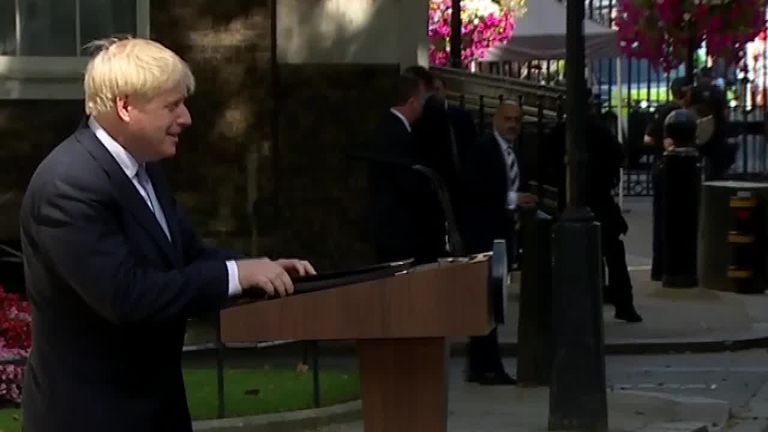What will happen if Boris Johnson faces no-confidence vote?

Wednesday 7 August 2019 11:14, UK
By Aubrey Allegretti, political reporter
Boris Johnson will have been prime minister for just three parliamentary sitting days when the Commons returns from recess. But that could be when he receives his first real test.
He faces the threat of a no-confidence vote - fuelled by a promise to take Britain out of the EU on Halloween "do or die" and a refusal to rule out suspending parliament.
So with less than 90 days until Brexit day, Sky News explains when the move to oust Mr Johnson could come and its effects on Brexit, a potential new government, and a general election.
What is a no-confidence vote?
It is a test by the whole House of Commons of whether the prime minister can govern with a majority of MPs' support.
Each member has to vote yes or no, or abstain, on the question of whether they have "no confidence in Her Majesty's government".
Labour leader Jeremy Corbyn has promised he will launch the vote against Mr Johnson but has not revealed when.
It could come in September if the UK carries on the path to a no-deal Brexit, to give MPs time to try and intervene and block such a scenario.
Or it could come in October if the clock is run down to exit day.
What happens if the PM wins?
He gets to carry on as normal - just as Theresa May did when she survived such a vote in January by 325 to 306.
What happens if the PM loses?
Under the Fixed-Term Parliaments Act, a countdown kicks in.
The Commons then has 14 days to pass a motion of confidence in either Mr Johnson's government or a new alternative administration.
If it fails to do so, power falls to Mr Johnson to set the date for a general election.
Westminster watchers say that if the prime minister wanted, he could call one for after 31 October - meaning Brexit happens anyway, and parliament is suspended for 17 working days in the run up to the election.
There is also a debate as to whether Mr Johnson would have to resign as PM if he loses a vote of no confidence.
Constitutional experts say that under a strict reading of the FTPA there is no requirement on the PM to quit, even if MPs were to support an alternative government.
Downing Street adviser Dominic Cummings is said to be working on a plan for Mr Johnson to frustrate his opponents by not advising the Queen to send for the proposed new PM and instead pursuing an election.
Although that would provoke political controversy and potentially drag the Queen into a constitutional crisis.
How could MPs use a no-confidence vote to thwart no-deal?
Dominic Grieve, a Tory MP and former attorney general, has suggested some of his colleagues could swing behind a no-confidence vote and bring the government down.
The aim, he told Sky News, would be to form a government of national unity to temporarily step in and ask the EU to delay Brexit again.
:: Listen to the Daily podcast on , , ,
Will it work?
Any Tory MP who votes against the government in a no-confidence vote would automatically lose the party whip - a serious repercussion.
And there are practical questions about who would lead a national unity government.
Mr Grieve said it would not necessarily be Mr Corbyn, who government MPs may refuse to support, with other figures such as Yvette Cooper and Hilary Benn tipped as potential stand-in prime ministers more palatable to the wider Commons.
Mr Johnson could also try to form his own government again, possibly with the help of MPs supportive of Brexit not on the Conservative benches, such as from the Labour Party and independents.
Other forms of government could be tested - such as a Labour-led minority coalition with parties such as the SNP, Lib Dems, Plaid Cymru and Greens.
But whatever combination of the tightly-balanced Commons, they must win a vote of confidence within those 14 days to have their position confirmed as the new government.







